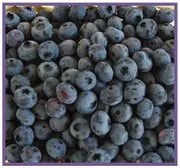 Worldwide, USA are leader in the production of blueberries with a cultivated surface of about 26,000 ha and a production of about 167,000 tonnes; though, Georgia is one of the most important producer.
Worldwide, USA are leader in the production of blueberries with a cultivated surface of about 26,000 ha and a production of about 167,000 tonnes; though, Georgia is one of the most important producer. The postharvest decay due to various fungal pathogens is a serious concern in commercial blueberry production; in the last 40 years, several techniques have been tested to control postharvest decay, for example pre-harvest fungicide sprays, postharvest chemical dips, postharvest cooling and CO2-enriched atmospheres.
Scientists at University of Georgia (USA) have evaluated the effect of selected essential oils on biofumigants in refrigerated conditions to control postharvest decay of artificially inoculated blueberry fruit; then the same scientists have evaluated the impact of biofumigation on sensorial quality and antioxidant properties of treated fruit. Blueberries were inoculated with Alternaria alternata, Botrytis cinerea and Colletotrichum acutatum.
The essential oils used for the biofumigation were cinnamon leaf oil, peppermint oil, linalool, and p-cymene; furthermore two commercial biofungicides containing plant oils were used (Sporan contained rosemary and wintergreen oils; Sporatec contained rosemary, clove, and thyme oils). Blueberries were treated by biofumigation for one week at 7°C.
Results showed that:
- only Sporatec reduced significantly the incidence of postharvest decay; while the other biofumigants resulted ineffective in controlling the development of fungal pathogens;
- biofumigation had a negative impact on sensorial quality, especially on sourness, astringency, juiciness, bitterness, and blueberry like flavour;
- no differences were found on antioxidant capacity and anthocyanins level among treated blueberries.
Source: Mehra L.K., MacLean D.D., Shewfelt R.L., Smith K.C., Scherm H., ‘Effect of postharvest biofumigation on fungal decay, sensory quality, and antioxidant levels of blueberry fruit’, 2013, Postharvest Biology and Technology, Vol. 185, pagg. 109-115. Further info: http://www.sciencedirect.com/science/article/pii/S092552141300149X
